An employee of the Veolia Group, the sponsor is the link between the partner with a project and the Foundation.
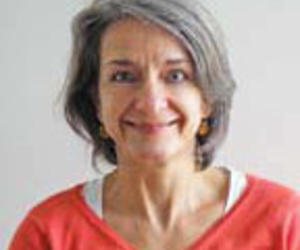
Manuèle Lemaire, director of Campus Veolia
"The financial assistance of the Foundation enables ARES to strengthen the supervision of its candidates for integration, in particular by helping them to better define their job profile."
Manuèle Lemaire, director of Campus Veolia for the Greater Paris region, is the sponsor of a Foundation-supported program put forward by ARES. This non-profit organization works with people who have the most difficulty in finding work and wants to improve its integration-through-work programs. Manuèle Lemaire explains.
You have been working for Campus Veolia Ile-de-France, which you now head, since 1994. When did you hear about ARES for the first time?
I had met Thibaut Guilluy, the current director of ARES [the name means "association for economic and social integration"], at the beginning of the 2000s. At that time, he was heading a different organization, Ateliers sans frontieres [workshops without borders].
We stayed in touch when he took on responsibility for ARES. Our first discussions were about La Petite Reine, which is one of the five ARES organizations and is dedicated to urban transportation using electric tricycles.
When the Veolia Foundation was set up in 2004, ARES naturally asked it to help on several projects.
The latest project, which the Foundation's Board of Trustees decided to support in March 2012, aims to improve the integration through- work program introduced by ARES. How did you come to be its sponsor?
There are many interactions between ARES, Campus Veolia and the Foundation. As director of Campus Ile-de-France, one of the company's six campuses, I also have responsibility for the Jouy-le-Moutier apprentice training center. There we offer work-study programs with the idea of being able to meet the HR needs of the different companies in the Veolia group.
With ARES, the idea is to identify the right people with whom, in the future, we will be in constant contact. An ARES job candidate is someone who has been supervised and helped after being accepted onto the integration program. So for the employer, he or she is a candidate that carries less risk of failure.
The program supported by the Foundation aims to bring ARES integration actions closer to the world of business. What are the bridges to be built?
The financial assistance of the Foundation enables ARES to strengthen the supervision of its candidates for integration, in particular by helping them to better define their job profile. They're offered courses in basic skills, such as French, math and IT, and the training programs are enriched through many chances to come into contact with the world of work.
For ARES, the idea is to organize visits to companies.
For us, the idea is to pass on information about our business activities, which are often not very well known by the general public, and in particular about posts that need filling and sectors where there are problems in finding people.
So ARES and Veolia have converging interests?
Yes, when we do a recruiting campaign to hire people under work-study contracts, and when our companies are trying to find good recruitment pools, ARES is a good contact. And the support that ARES gives its integration employees helps in turn the new employer.
ABOUT THE SPONSOR
Manuèle Lemaire has been working for Veolia since 1994, the year when Campus Veolia was set up. Hired as an educational coordinator for work-study programs, she was appointed to head the apprentice training center in 2002 and Campus Ile-de-France in 2010.
MORE ABOUT THE PROJECT SUPPORTED
> Ares - Log'ins
The Foundation helps the Ares project to develop a new activity in logistics and reinforce back-to-work projects.
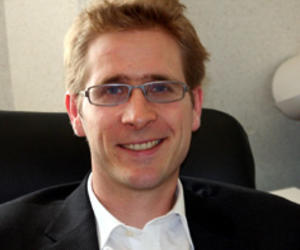
Interview of Eymeric de Chaumont, sponsor of the association Espaces
“I'm convinced that by combining their skills and ours, we can provide innovative solutions for the development of these urban territories and also for rainwater management.”
As a young engineer who joined Veolia Water in September 2007 (Paris Region - Center Sales Division), Eymeric de Chaumont happened to meet the director of the nonprofit Espaces, specialized in the ecological management of the urban environment in the Val de Seine area. He shares the same concern with this nonprofit organization: the reintegration of water in the city through the management of rainwater and waterways, combined with the wish to develop "plant engineering" techniques. Two years later, he decided to offer his services to the nonprofit and to sponsor it with the Veolia Foundation.
How did you happen to contact Espaces?
My wife, a student at the school of architecture in Versailles, where she was working towards a diploma in "History and Landscape", discovered that the director of Espaces was coming there to give a lecture.Knowing that I would be interested, she signed me on.That was in 2008.We talked a bit about our mutual interests: the management of waterways and their banks and environmental conservation in an urban setting.
But I had just joined Veolia Water, and didn't have much free time to spare.Things sort of stayed that way until the nonprofit approached the Veolia Foundation to obtain a grant.I then decided to become their sponsor so that the project could be proposed to the Foundation.
What encouraged you to become a sponsor?
During my engineering studies at the ESTP (Specialized School in Public Works) and in the course of my MS studies in Los Angeles, I became really interested in the management of rainwater and waterways.I accordingly acquired certain skills close to the concerns of Espaces.Besides, this nonprofit expands its environmental commitment by offering work to persons in serious difficulty: the social dimension is a salient part of its projects.
Accordingly, my initial motivation was intensified by a human commitment, a sort of quest for meaning.Even in the public service professions, work cannot supply all one's needs ... however, it can mobilize more resources than previously ascertained.This is why, when Espaces needed help in developing a new project in October 2009, I converted my volunteering dream into a concrete and effective engagement as a sponsor with the Foundation.Together, we then prepared the file to apply for a Foundation grant.
What was the special attraction of the activities developed by Espaces?
Generally speaking, it's their visionary approach to the reintegration of nature in the city.
Espaces militates and acts in favor of a "differentiated management" of open spaces without pesticides and for a reliance on plant engineering on waterways.In concrete terms, Espaces began its action in the Hauts-de-Seine district, where the banks of the Seine are extremely stony. Nothing but concrete wherever you looked!The nonprofit then took part in the development of the Ile Seguin - the former site of the Renault plants in Billancourt.Plant engineering works on the same desiderata as civil engineering, but it seeks plant-related answers.The issue is always to consolidate the banks, the slopes, but by "renaturalizing" them.Wooden piles are embedded, and are soon colonized by the typical flora of the riverbanks: reeds, weeping willows, etc.In this way, a biodiversity which had previously disappeared is reborn.Pollinating insects, birds, etc. return.
Since this experience, Espaces has continued to work for the development of biodiversity in an urban environment with interested local municipalities (in the Val de Seine in particular), as well as the "green web" of the railroad slopes of the Réseau Ferré de France (RFF) and SNCF railroads. It has created a promenade in the 16th district of Paris on a portion of the former "inner belt" railroad of the capital: from a wasteland, it has recreated a haven of biodiversity.
How do you want to continue your engagement with Espaces?
I'm looking forward eagerly to expand the volunteering of expertise with Espaces.I'm convinced that by combining their skills and ours, we can provide innovative solutions for the development of these urban territories - waterway banks, railroad slopes, industrial wastelands - and also for rainwater management.
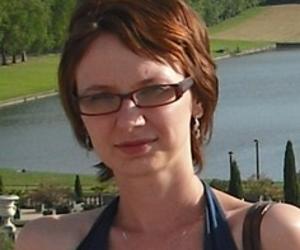
Interview of Anca Strachinaru, sponsor of the association Hors la Rue
“One has the feeling that one has succeeded in doing something to effect a small change in the destiny of these children.”
Anca Strachinaru, who has Romanian origins, is in charge of promoting the group's business units in the schools on the Veolia Campus, joined Veolia Environnement two years ago, after completing a training course. Very quickly, in association with the Veolia Environnement Foundation, she became a sponsor of the project set up in Montreuil (93) by the association Hors la Rue: the opening of a day welcome center for young Roma in danger in Ile-de-France.
What made you decide to become a sponsor of a project backed by the Foundation?
I've always been very interested in the activities of the associative world, especially in the integration of publics facing serious difficulty. In the course of my post-graduate studies, I worked for example in several social integration projects for former prison inmates.
In 2008, looking for a company to do my study completion course, I discovered the projects of the Veolia Environnement Foundation, which I found fascinating, and which guided me towards my professional choice.I had the opportunity of being selected and hired at the end of the course.I then immediately contacted the Foundation, advising them that I was available to become a sponsor.My Romanian nationality obviously predisposed me to accompany a project linked to people of Romanian origin.
How did your meeting go with Hors la Rue?
My enthusiasm was immediate! I went to see them four or five times to prepare the grant application to the Foundation.My studies in sociology helped me grasp and understand the objectives of the association and their professional methods.Together, we analyzed the needs of the young persons to whom they reach out in terms of integration and accompaniment.It wasn't an easy task!You can't simply rise to the level of compassion, you have to understand the causes that propel these young persons into the street, and then act accordingly. Hors la Rue accompanies minors who are often in serious danger (victims of delinquency, prostitution networks, etc.), who have to be guided gently toward a world more suited to their age, by helping them build a life project (schooling, training, etc.).
I was impressed by the team's professionalism.Hors la Rue is developing a major activity upstream to identify the young persons who are ill treated and in danger.It collaborates with the Children's Court, the Educational Service in the Court, Children's Aid, the Minors' Brigade.This clearly proves its legitimacy with these institutions. Over and above my sponsorship role, I offered them my services as a volunteer.
What types of service?
My ideal would be to help these young persons return to Romania with a sufficient baggage and status to help them integrate and build a proper adult life.
In order to facilitate this apprenticeship, my first proposal will be to set up French courses dispensed by the Romanian Students Association in Paris - of which I'm a member, in order to help them understand the cultural references. Then, why not consider working alongside the Veolia Campus, and then with Veolia Eau in Romania? Or even, why not continue to develop more preventive projects in Romania? I believe that together, we can try out several alternatives.
So your involvement is going to become very serious?
Quite honestly, I feel that the energy and time that I have devoted are nothing in comparison with the task ahead! When I learned that the Veolia Environnement Foundation had decided to help the project, I was over the moon! I told myself "mission accomplished": at these times one has the feeling that one has succeeded in doing something to effect a small change in the destiny of these children.
LEARN MORE ABOUT THE PROJECT SUPPORTED
> Hors la Rue
Inauguration of a day care center for young isolated Romanians in danger in Montreuil.
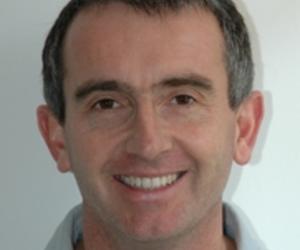
Interview of Bertrand Auneau, sponsor of the K-Prod project
“A group of youths who all work hard, unpaid, with extraordinary enthusiasm, love for their neighborhood and total friendship.”
Sponsor of the K-Prod project: a web-TV serial broadcast on Arte, produced and performed by the inhabitants of a number of difficult neighborhoods of the Bordeaux suburbs.
Bertrand Auneau, director of a Veolia Propreté agency specialized in services to communities in Gironde, has just completed a remarkable experience thanks to his commitment as the sponsor of a project backed by the Veolia Environment Foundation. With the young actors of K-Prod, he found enthusiasm, determination and human warmth which will take him a long time to forget.
What is your recollection of your first meeting with K-Prod?
I experienced a real shock! This TV serial project on the Arte website takes place in the Aubiers, a Bordeaux neighborhood where many persons live in extremely difficult conditions.
A place where I don't usually go. I met the production crew and some of the actors. The shock was to discover this fascinating project, and this group of youths who all work hard, unpaid, around the producer, Lydia. With extraordinary enthusiasm, love for their neighborhood and total friendship.
In the afternoon, we were invited to lunch by the mother of one of them, I found myself on the fifteenth floor of one of the towers, sharing an African style meal, all seated around the dish, with genuine exchanges, impressive human warmth, solidarity, bursts of laughter, a real verve... all things that it's pretty hard to find "elsewhere" today.
In your opinion, what are the reasons why they started this adventure?
Life in Aubiers is far from easy! Some of the youths already have a rather chaotic past. One of them was just released from prison when I met them... Above all, I feel that they have a tremendous need to escape from their daily habits, something that is not always easy.
And besides, they really need to prove to themselves, and to their families, their neighbors and everyone else, that they are not delinquents. That everything has not fallen apart. You can see that they really want to get out of that situation. One of them told me: "You can't imagine, when you've served time, how difficult it is to get back to normal. You have to be really strong psychologically". This project transports them to another life, it's a lifebuoy which they hang on to with energy and enthusiasm, while learning new skills.
At the same time, and this is also very important, this web-TV series, which mainly takes place in the suburbs of Bordeaux, is recreating a new dynamism in their neighborhood. The project is supported by all the inhabitants, who are extremely proud of it. Together, we met people who greeted them with a joyful high-five. This brings back hope. And you have to admit that some of these youths already have the right "looks" and genuine artistic talent.
What do you derive personally from this sponsorship?
When I meet people like that, I can only be enthusiastic! Rarely have I come across such generosity.
The crew of K-Prod, through its dynamism and the quality of its project, really makes you want to get involved. Personally, it is extremely enriching, and besides, in such a project, we rediscover all the values honored by our company.
LEARN MORE ABOUT THE PROJECT SUPPORTED
> K-Prod
Aid for the production of a web-TV serial produced and performed by the inhabitants of a difficult neighborhood.
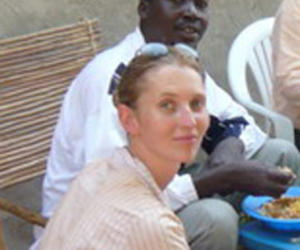
Interview of Aurélia Greff, sponsor of the project "La Voûte Nubienne" in Madagascar
“The association is doing an extraordinary job of training and transmitting knowledge!”
A multimedia communication manager of Veolia, Aurélia Greff, in organizing her holidays, prefers encounters with the populations of the towns and villages that she visits.
This penchant has led her to a very special association : La Voûte Nubienne.
How did you happen to discover La Voûte Nubienne?
In 2008, I wanted to spend my holidays in West Africa, and specifically in Burkina Faso, the "country of honest men". With my partner, we wanted to meet the men and women of the country, famous for their very warm welcome. And being very sensitive to the action of the Veolia Foundation, I also wanted to make a field trip to see how the aid granted was used. On the Foundation's internet site, I found the projects supported in Burkina Faso. The Nubian vault project caught my fancy. I contacted the chairman, Thomas Granier: the connections happened very simply. We left for a month between October and November 2008, deciding that two weeks would be devoted to visiting the association's various projects.
How did the trip go?
The association headquarters in Burkina is in the town of Boromo.
We routed our visit around this town, riding moped from village to village.
We met masons trained by the association and admired the many buildings : church, small millet brewery, grain silos, homes, hotels ... we slept under Nubian vaults : the rooms were far more pleasant, cool and comfortable, than those under tin roofs!
We also had the luck to be there at the time of the conference of masons organized by the association: about 80 persons attended and came to hone their skills. For example, the association La Voûte Nubienne teaches the masons without reading and writing skills how to prepare an estimate: it's doing an extraordinary job of training and transmitting knowledge!
That being said, you became the sponsor of a project underway in Madagascar, of which the leader is the association Écoles du Monde : how did you switch from one project to the other?
It so happened that the managers of Écoles du Monde had discovered the work of La Voûte Nubienne and were interested in importing it into Madagascar. I was already familiar with the country, which I really love.
I knew that the needs over there, particularly for housing, were enormous. When I realized that Écoles du Monde was ready to apply for aid to set up the project, I immediately offered to be the sponsor for the Foundation.
All aspects of sustainable development are present in this project : the principal players acquire real self-sufficiency (experienced Burkina Faso masons will transmit their skills to Madagascan colleagues), the families can participate in building their own homes, the materials used are cheap and help fight deforestation.
It's a really great initiative!
LEARN MORE ABOUT THE PROJECT SUPPORTED
> Ecoles du monde Madagascar
Import to Madagascar of the roof building technique called "Nubian vault", inexpensive and ecological.
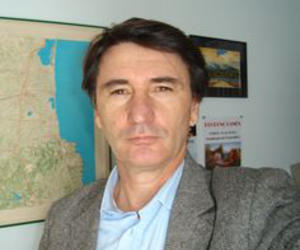
Interview of Philippe Mignard, sponsor of an arboretum project
A Unit Manager in the Veolia Agency in the Pyrénées-Orientales district, Philippe Mignard regularly criss-crosses a magnificent landscape: the Côte Vermeille south of Perpignan as far as the Spanish border.
This natural site, which is splendid but vulnerable, due especially to the lack of water and the hordes of tourists in summer, led him to focus on an arboretum project developed by the association Naturalia et Biologia above Banyuls-sur-Mer.
How did you get in touch with the leaders of this project?
We were already acquainted. In fact, the arboretum project is led by the association Naturalia et Biologia, of which the Arago Oceanographic Laboratory in Banyuls-sur-Mer is a member. In fact, this laboratory regularly works with Veolia Environnement, particularly on the quality of water for swimming. One of its managers, Professor Philippe Lebaron, discussed this project with me. There is a very interesting geographic continuity: the oceanographic laboratory offers the visitors a shallow marine trail, where small panels present the submarine coastal fauna. The arboretum will start in the prolongation of this trail and continue along the mountainside.
Why create an arboretum just there ?
That's an interesting story. Above the Arago Laboratory, an old stone house has been used to accommodate researchers from all over the world who come there to study.
In gratitude, they have picked up the habit of providing plants from practically everywhere. The plantation of exotic species just happened this way, very spontaneously.
Why did you decide to accompany this project as a sponsor ?
I'm a Catalan and I love this part of the coast. The project, which will help to improve it significantly, excited me. But over and above this, as a manager of Veolia, I wondered about the synergy between this project and our mission. I believe that by helping Naturalia et Biologia to upgrade this site, we are all involved in an exemplary educational action: we are demonstrating to the public at large and to elected officials that even in very arid regions, where water is scarce in summer, there is a way to grow magnificent plantations. We have a consultancy role with the population on the use of water: if, thanks to the arboretum, we manage to reduce the number of lawns in our region, in favor of plants that are less greedy for water, I believe that we will all have contributed to the preservation of this so precious resource.
Did the sponsor role create a big problem for you, in view of your work ?
It's a little bit of extra work, that's true, but it's no big deal. I had already sponsored a home meal carrier service many years ago. At the time, we helped a person to create his job, today, there are two employees ... I'm very concerned about this economic aspect. As a citizen, if we can participate in projects to create jobs, there is no time to lose! The development and inauguration of the arboretum to the public will help immediately create two fulltime jobs, plus a number of temporary jobs during the summer season. And I have a habit of saying: "Our little drops of water will finally fill large reservoirs!"
LEARN MORE ABOUT THE PROJECT SUPPORTED
> Université Pierre et Marie Curie
Development of a botanical park at Banyuls-sur-Mer.
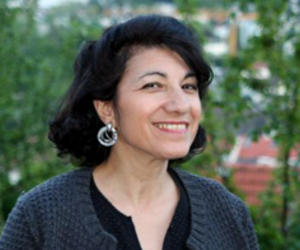
Interview of Hélène Gabay-Humienny, sponsor of the association "Parrains par Mille"
For the last ten years, Hélène Gabay-Humienny has been "lending a hand" occasionally to one of her friends working in the association Parrains par Mille.“I'm amazed to observe the strength of the relationship between the sponsors and their charges.”
In 2007, increasingly involved with the association, she became its sponsor with the Veolia Foundation
How did you learn about Parrains par Mille?
A friend of mine is a founder member of the association. In the course of a conversation, I realized that their commitment perfectly matched my own criteria for seriousness, ethics, and rigor.
In 1998, I started responding every time my friend needed my expertise.
For example, I helped them finalize their application for funding from the General Council in several French provinces. It was always a one-off deal.
What's spurred you to do more?
The underlying idea - by sponsoring a child living in difficult situations, one can help it build a life against all odds - pleased me. And then, since 1998, I had many opportunities to observe the results of the encounter between a sponsor and a child in difficulty. In 2007 for example, the association addressed 250 requests.
Very often, they concerned families in dire straits, which the social services sent us as a last resort, to try to avoid separating the child from its family.
No one imposes this link, to the contrary: the psychologists of Parrains par Mille first confirm that the family has applied for help, that the child agrees to meet a new adult regularly, and that the sponsor is "solid". The child/sponsor couples are then regularly monitored.
And then, wonderful things happen! I'm amazed every time to realize the strength of the relationship that develops over the years between these adults and these children. The sponsors offer them an alternative framework for living, in the evenings, on weekends and during the holidays, and this enables them to restructure their lives.
I recall, a few years ago, a very highly strung little boy. He twitched constantly, couldn't keep still. He's now 13, self-possessed, knows what he wants to do in life, and seems content with himself.
How did you get the idea of applying to the Veolia Foundation?
I looked at the selection criteria set by the Foundation and kept them in mind, observing their activities from a distance. When Parrains par Mille decided to open the "Maison du Parrainage", I figured that we needed assistance for this to happen, and it occurred to me to ask the Foundation for help. We received 30,000 euros: precisely the budget we needed to complete the Maison du Parrainage. The Association's team and I were very happy with this grant. As an employee of the group, I'm proud to know that a major corporation like ours is capable of helping associations in essential areas like aid for children in difficulty, even though this does not correspond with its core professions.
And yet I have one regret: that the Foundation only grants aid for one-time operations and not for operating budgets. I know that it's routine practice, but maybe it needs to change: the budgets allocated to the associations by the state and the territorial authorities are constantly reviewed downward (or frozen in an electoral period).
The associations are therefore reduced to filing funding applications one after the other. Their staff spend an inordinate amount of time managing the funds for the association, rather than focusing on their raison d'etre, and that's a pity.
Do you intend to continue helping Parrains par Mille?
Absolutely. My daughter is now grown up and doesn't need me as much as she used to: I have more free time to devote to voluntary activities. Now that the association is properly constituted, I plan to give them stronger and more regular legal support.
And perhaps someday, I may decide to sponsor a child myself. But this implies a major change in life. I'm not ready yet.
LEARN MORE ABOUT THE PROJECT SUPPORTED
> Parrains par'mille
Fitting out the new Sponsorship House.
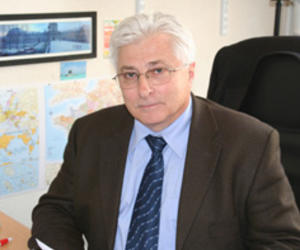
Interview of Alain Bunisset, sponsor of the association "Les Ateliers de la Bièvre"
Assigned by his regional manager, and together with the HRD, to set up the Plan Handicap at Veolia Eau Ile-de-France Centre, Alain Bunisset has been organising partnerships since 2005 with a number of ESATs* and similar companies.Meetings that clearly excite his enthusiasm."They're terrific professionals!"
What is your mission with the Plan Handicap?
Since the bill on handicaps was passed in February 2005, all companies with more than 20 employees are legally obliged to reserve 6 % of their salaried workforce for handicapped persons.Of the 6%, half may nevertheless be employees hired by the company, and the other half, employees working in companies of the private sector.
The regional division of Veolia Eau Ile-de-France Centre promptly expressed its determination to work for handicapped persons by developing these two solutions.In early 2006, Union Économique et Sociale Veolia Eau accordingly signed an agreement with Agefiph** to promote the integration of handicapped persons, maintenance of these persons in the workforce, and to meet the legal obligations.
This explains part of my current work.Alongside the regional Mission Handicap, we prepare to welcome the handicapped persons.We organise awareness sessions for their future colleagues, in order to remove any psychological obstacles with regard to handicaps.
Besides, I'm mainly in charge of developing subcontracting with the protected sector in the region.In concrete terms, I visit the agencies and, with their directors, identify the needs which can be addressed by this type of company: maintenance of open spaces, laundry, refurbishing, packaging, organising receptions, mailing campaigns, etc.Then I meet the local ESAT's to check whether they can respond to these requests.(If necessary, I may even ask them to train part of their personnel to provide a service that is better adapted to our needs).This is how I came across the laundry of the ESAT du Père Lachaise managed by the association Centres Pierre et Louise Dumonteil, at the ESAT de la Bièvre.
Why did you decide to assist the laundry of the ESAT du Père Lachaise with help from the Veolia Foundation?
When I visited this establishment for the first time, its manager drew my attention to the fact that the equipment they used was obsolete, very inefficient, and extremely fatiguing for the handicapped employees.Besides, the laundry only processed 900 kg of linen per day.There was definitely room for improvement!
So I helped them to obtain a grant from the Foundation, which enabled them to renew their linen treatment process completely and to improve the working conditions of the employees - today, they have air conditioning, which isn't a luxury in a laundry!They have also doubled their production: they take charge of 2 tons of clothing daily.They have also grown from 40 to 80 employees.Thanks to this improvement of the working capability, I can now entrust them the whole cleaning contract for the work clothing of our Paris employees.That will certainly put their activity on a solid footing.
You say you're impressed by the quality of the contacts that you had with the mentally handicapped persons of the ESAT de la Bièvre...
This establishment employs psychotic adults who do amazing things in the field of metalworking and electromechanical operations.Since I'm a DIY fan myself, I was staggered by the quality of their creations.They think about everything and imagine fantastically clever, extremely functional objects.These persons have suffered serious problems since their childhood, so that by coming to work here daily, in a very strict setting where safety is the top priority, they are gradually integrated into everyday life.
Besides, whereas for years we, the healthy, left these persons on the sidelines, they approached me with the outmost friendliness, with a deep wish to establish a dialogue.We have a lot to learn from them:They are much more open than we are, and demonstrate a faultless professionalism that helps them surmount their handicaps.
Having been a union delegate for years, I look forward to the day when, in France, these people will secure their rightful place in the staff representation organisations.
You have sponsored two projects for the time being: how do you see the sponsor's role?
To fully perform his role, the sponsor has to make a personal investment.He has to understand the problem of the structure that enlists the Foundation's help, discover and analyse the needs of its activity:we have to "live" the project from inside!With my many years of professional experience, this is a unique opportunity to transmit the expertise gained in the Group.I have already started exchanges of this sort with the managers of the two ESATs: they come to ask me questions, knowing that I'm ready to invest alongside them.
You'll be retiring in a few months: would you like to continue these projects?
I certainly would!I feel that the Veolia Environnement Foundation offers me tremendous motivation to approach the next phase of my life, which is retirement.As sponsors, we know that we can continue to invest ourselves in a highly interesting activity, that we can participate in a project of general interest.This is extremely positive: it opens up a new future!
LEARN MORE ABOUT THE PROJECT SUPPORTED
> GERRMM - Esat de la Bièvre
Renovation and development of a metalworking shop to employ psychotic adults.
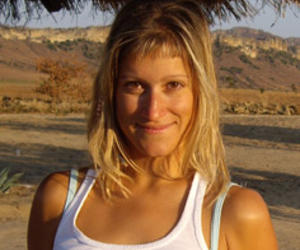
Interview of Alexandra Sourzat, sponsor of the association "Ecoles du Monde Madagascar"
"I didn't want to make out a check to a humanitarian association every year. With the association, I can provide concrete help in my own field, which is water treatment."
How did you hear about Ecoles du Monde (EDM) Madagascar?
I was planning a one-month trip to Madagascar. I had started gathering clothing for the inhabitants, but I soon realized that I wouldn't accomplish much by myself. I therefore talked about it to my manager, who sent me to a former employee of Veolia Environnement. This person, now retired, is now a volunteer for the association Ecoles du Monde - Madagascar. Their goal is to develop a local economy in the small villages of the island to stem the rural exodus. He suggested contributing my skills, so I left in September 2007 during my holidays.
What did you do on the spot?
I was terribly shocked by the extreme poverty. In the south, where water is very rare, I realized what a liter of water meant: it was what we had every day to wash ourselves.
I then joined the association to supervise the installation of the sanitary facilities in the public schools of the city and in the bush villages. Over there, I was absolutely staggered by the persistence of certain misconceptions. In one village for example, the chief, an old man, thought that sanitary facilities were "fady" (home of evil spirits) and therefore refused to allow the villagers to use the installation! Fortunately, the youths at the school had used them in the city. So they demonstrated their use. It takes time for mentalities to change.
What was the next step?
Back in France, I wrote a report on the progress of the construction work in the city and the bush. I compiled a package requesting financing from the Veolia Environnement Foundation. The aim of this project is to replace the water pumping system in the villages of the coast. The wind generators, which required a lot of maintenance and which are ineffective during windless periods, will be replaced by a system of solar pumps.
I agreed to verify the proper use of the funds. I am therefore returning to Madagascar in November 2008 to take photographs and supervise the construction of the wells. This will give me the opportunity to analyze the water.
What do you draw from this experience?
I'm philosophical about my daily life. My trivial concerns are nothing compared with the concerns of the Madagascans, who don't always know where their next meal is coming from.
LEARN MORE ABOUT THE PROJECT SUPPORTED
> Ecoles du Monde Madagascar
Installation of solar pumps to run the water supply networks of seven villages.
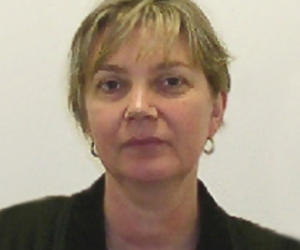
Testimony of Clotilde Bottino, sponsor of the Ellen Poidatz Foundation
33 years ago, I crossed the threshold of the Ellen Poidatz Foundation.“ Warmth, outstretched hands which erase the differences...”
This establishment was to become my new roof for an indefinite period.
I was a boarder, in a place where wheelchairs, trolleys, crutches and splints were the companions of a multitude of children with whom I did not identify. I happened to fall into the category of "walkers", and I couldn't grasp the deep meaning of all this. What could be more natural than walking? Yet curiously, there was a warmth, outstretched hands drawing you in and erasing the differences: when I was no longer at the category of "walkers", I understood what it meant to be different, and I understood the importance of the mutual aid that enhances integration. I spent a whole year in these large buildings. It's the type of ordeal that transforms you and marks you forever. I still have lasting friendships with some of my comrades.
My personal and professional life then unfolded very far from the little village of Saint-Fargeau. Coming to live in the Paris region, I often walked by the wall of the Foundation, without daring to enter again. And then, a conversation with Delphine Drouaud, the sponsor of the association "Femmes actives", awakened me and I decided to take the next step.
About two years ago, I again contacted the new management of the Foundation. It was a deeply moving experience! I found my manager of the girls' section (a person whose abnegation demands respect, still active even though retired today). With the help of the Ile-de-France-Centre region, IT workstations were provided to the Foundation to expand the group of PCs used in the school activities. This technical improvement offers many children who cannot write access to a mode of communication that the pen and sheet of paper cannot provide.
In 33 years, many things have changed. Development has been considerable. At Saint-Fargeau you find personal motivation in the service of the children, still unquenched, almost a calling. The projects are many and varied. Addressing all areas (medical, educational, school, environmental, etc.).
Today, the Veolia Foundation has taken charge of a medical project, and I hope that the part of my childhood that I left between these walls will be able to help other children through this experience."
LEARN MORE ABOUT THE PROJECT SUPPORTED
> Ellen Poidatz Foundation
Acquisition of a very costly facility to improve the care provided to children in a physically handicapped situation.
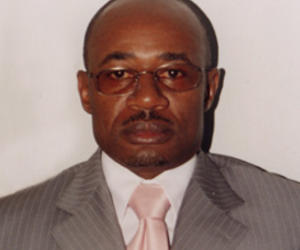
Interview of Maxime Zyma, sponsor of the association "Sida Zéro"
Maxime Zyma sponsors "Sida Zéro", an association which has built a care center for persons affected with HIV in a disadvantaged suburb of Libreville.« I felt I was instilled with a responsibility that went far beyond "mere" sponsoring. »
What is your position in Veolia?
I am a work doctor and head of the Health Division of the Société d'Energie et d'Eau du Gabon (SEEG), a subsidiary of Veolia Eau.
In what circumstances did you discover the association that you are sponsoring today?
The Association Sida Zéro accompanies us in the implementation of our HIV/AIDS action plan. So it is in this setting that we were contacted by Mrs Perpétue NDONG, President of Sida Zéro, requesting support in this project, whose objectives merged with our own. In fact, our program, we have provided for an external aspect targeted at the general population. By this act, we want to assert the civic nature of our enterprise. Yet the cost of the project made it impossible to respond favorably to this funding request.
What made you think about the Veolia Foundation?
I knew a little about the Foundation, but I had never been a sponsor previously. It was Dr Bruno de Buzonnière, Health Director of Veolia Environnement, who advised me to submit the project to the Veolia Foundation.
What are the first visible effects, or preliminary results of your sponsoring?
The Centre d'Appui et d'Accompagnement (C2A) was officially inaugurated in December 2006. Activities began timidly and we expect to reach cruising speed at the end of the first year. However, the center already accommodates several persons living with HIV and conducts early detection.
How has your commitment materialized?
"The "Guide for sponsors" gives details on the level of commitment of the sponsor. It is obvious that very quickly, my commitment went much deeper. From "project sponsor", I turned myself into a "project leader". I felt I was instilled with a responsibility that went far beyond "mere" sponsoring. I want to remind everyone that many grants were needed for this project. I thus assisted Sida Zéro in processing these financing applications with other structures. Today, I have decided to intensify my involvement and to become a member of Sida Zéro".
Why do you engage in sponsoring? What does it offer you?
That's a difficult question. Whenever I have the opportunity to do something for the most vulnerable people, I simply don't ask any questions...
I have to admit that for myself, it has been a magnificent experience to make myself useful professionally and extremely gratifying personally.
LEARN MORE ABOUT THE PROJECT SUPPORTED
> Sida Zéro
Construction and fitting out of a center for combating AIDS in Libreville.
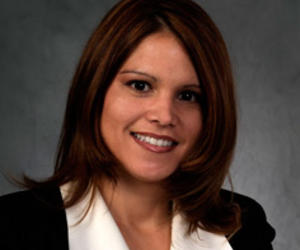
Interview of Denisse Ike sponsor of the association « Northern Illinois Food Bank »
The opportunity to directly impact the communities in our area piqued my interest."
Denisse Ike sponsors the non-profit organisation "Northern Illinois Food Bank", which distributes over 12,000 metric tons of food every year to people living under the poverty threshold in the suburbs of Chicago.
What is your role in Veolia?
I am the Marketing & Communications Assistant Director for Veolia Environmental Services North America Corp., located in Chicago, IL.
Under what circumstances you discovered the project you are sponsoring today?
The organization called my office, looking for a corporate communications contact person and requested a donation. The opportunity to directly impact the communities in our area piqued my interest. We scheduled a meeting, followed by a tour of their facility in St. Charles, Illinois. It was then that we learned that Northern Illinois Food Bank is a non-profit organization that receives donated food and grocery products from retailers, manufacturers, corporations and community resources and distributes it through more than 520 food assistance sites to help the 262,565 people living in poverty in northern Illinois. The Northern Illinois Food Bank provides food assistance to 37,400 different people each week.
Could you give us concrete examples of your actions?
I have been working with the Northern Illinois Food Bank and Veolia Environmental Services North America to engage our employees in community outreach programs. We participate in Mobile Food Pantries and organize company volunteer participation to help feed the hungry in our area.
Why did you go into sponsoring?
It's a vehicle to reach out to the communities in our area and make a difference for thousands of families in need. It is also a very rewarding experience, to be able to help thousands of people and make a difference in their lives. In a nation that is so prosperous and wealthy it is hard to believe that nearly 35 million Americans are threatened by hunger, including 13 million children.
LEARN MORE ABOUT THE PROJECT SUPPORTED
> Northern Illinois Food Bank
Development of food aid distribution in the suburbs of Chicago thanks to vehicles adapted to all drivers.

